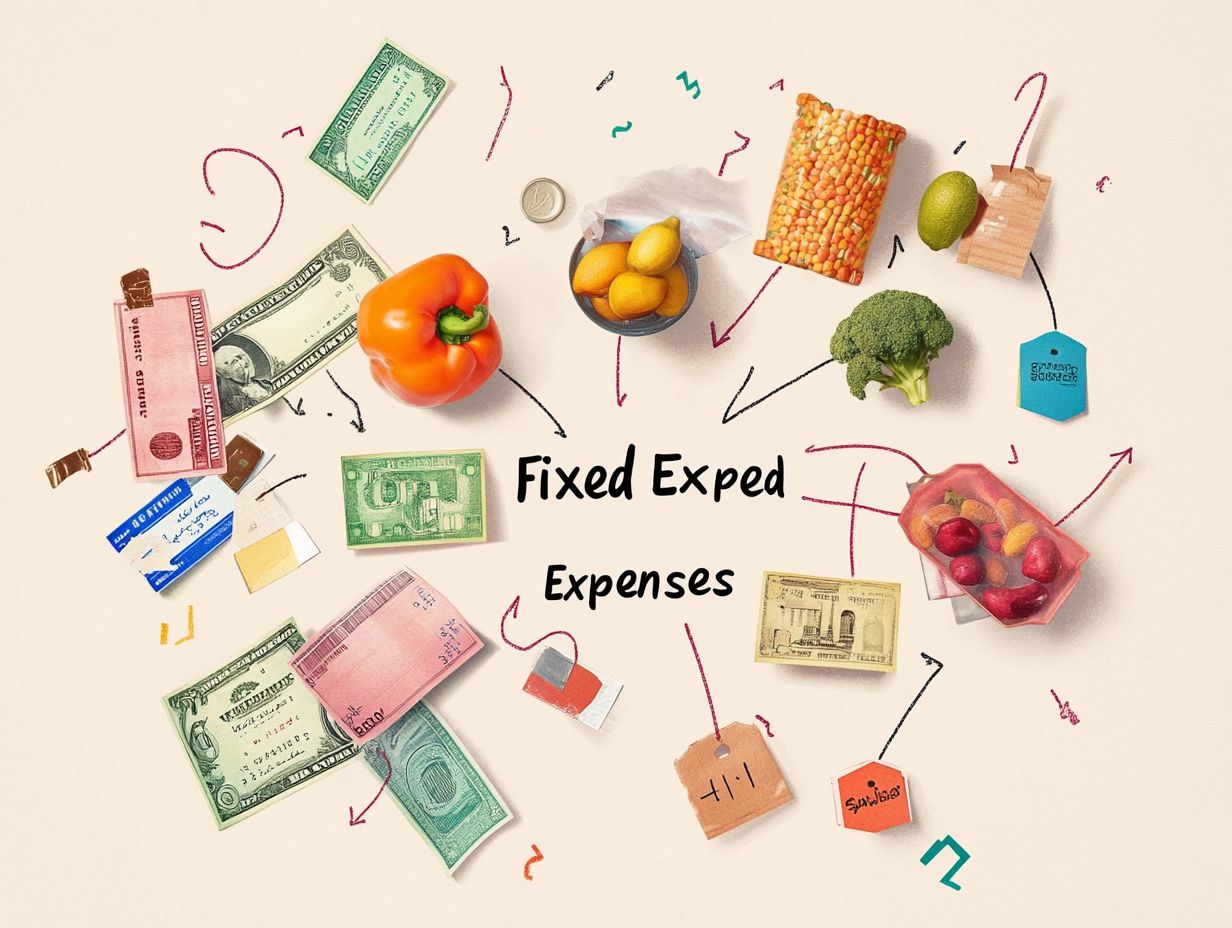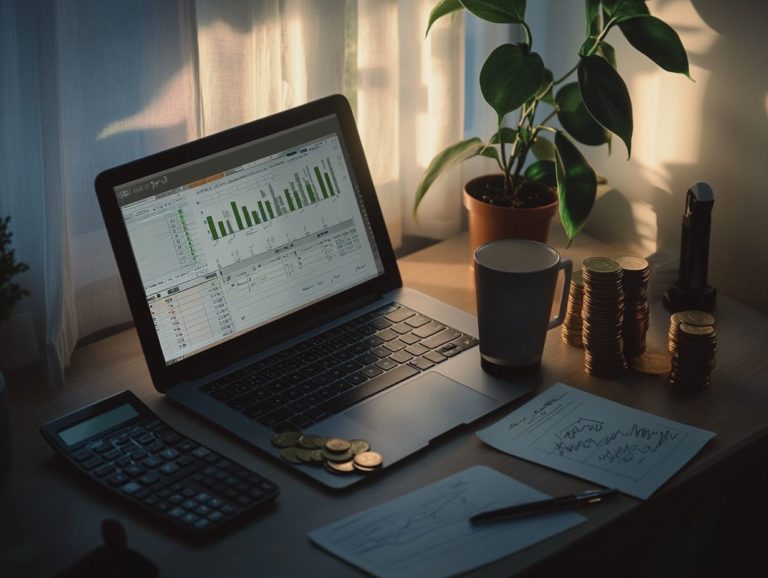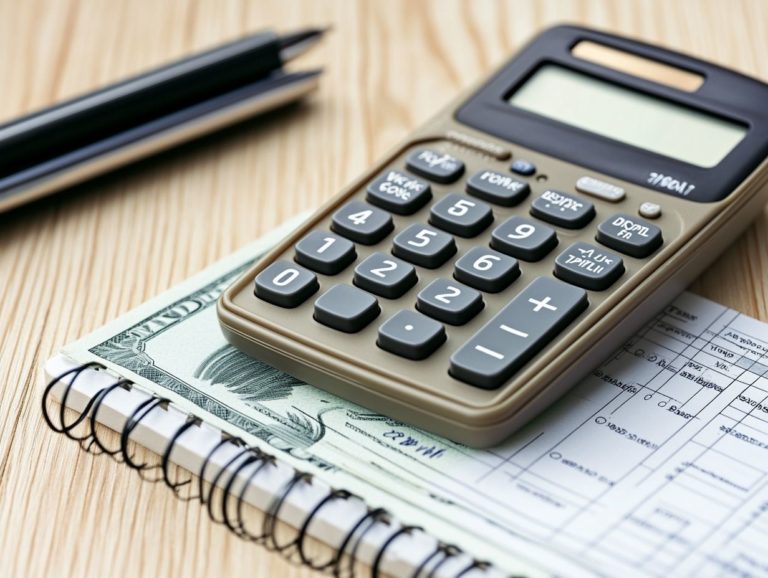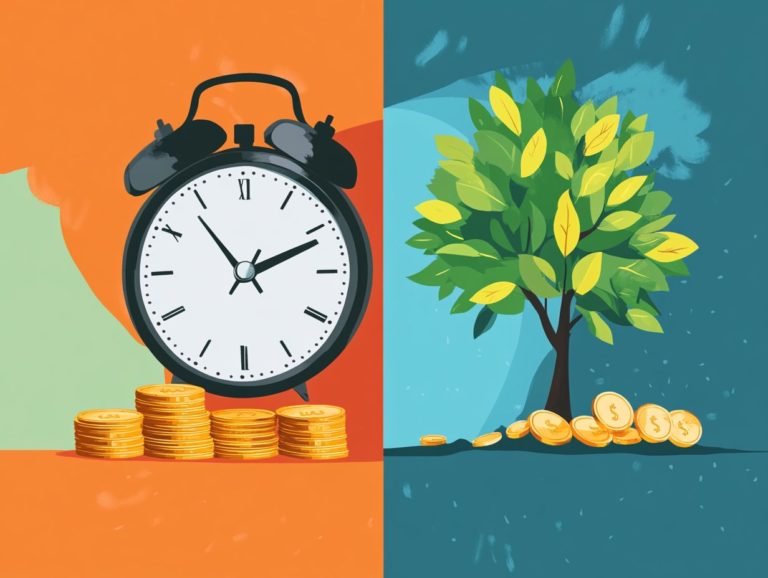What are Fixed and Variable Expenses?
Get a grip on your fixed and variable expenses now to build a strong budget! Understanding the distinction between fixed and variable expenses is essential for mastering budgeting and financial management.
Fixed expenses, such as your rent or mortgage, stay the same each month. This consistency provides a sense of stability. In contrast, variable expenses like groceries and entertainment can fluctuate, adding unpredictability to your financial landscape.
This article delves into definitions, offers illustrative examples, and presents practical tips for budgeting and tracking both expense types. By the conclusion, you ll walk away with the confidence to manage your finances effectively!
Contents
- Key Takeaways:
- Understanding Fixed and Variable Expenses
- Examples of Fixed Expenses
- Examples of Variable Expenses
- How to Budget for Fixed and Variable Expenses
- The Importance of Tracking Fixed and Variable Expenses
- Frequently Asked Questions
- Can fixed expenses become variable expenses?
- What are some tips for managing fixed and variable expenses?
Key Takeaways:
- Fixed expenses are costs that remain constant regardless of changes in usage or production, while variable expenses are costs that fluctuate with changes in usage or production.
- Examples of fixed expenses include rent, mortgage, and insurance premiums, while examples of variable expenses include groceries, utilities, and entertainment.
- Proper budgeting and tracking of fixed and variable expenses is crucial for financial stability and responsible money management. Regularly monitor and adjust expenses to maintain a healthy balance.
Understanding Fixed and Variable Expenses
Understanding fixed expenses and variable expenses is crucial for mastering your budgeting game. These categories form the foundation of your monthly expenditures.
Fixed expenses encompass recurring payments think rent, mortgage, and insurance premiums that stay the same month after month.
On the flip side, variable expenses like groceries, entertainment, and personal care can vary. This variation gives you room to maneuver in your financial decisions.
By clearly distinguishing between these two types of expenses, you can craft a monthly budget that balances essential needs with optional spending. This paves the way for more informed financial planning and enhanced expense management.
Definition and Differences
Fixed expenses are reliable costs that remain unchanged month after month. Examples include your mortgage payments, rent, and insurance premiums.
On the other hand, variable expenses are costs that can fluctuate, such as groceries, entertainment, and personal care. Categorizing your expenses into these two distinct groups gives you a clearer perspective on your financial landscape.
Fixed expenses require careful budgeting since they are ongoing commitments. Variable expenses, however, offer flexibility and opportunities to save.
For instance, you might have a monthly gym membership as a fixed expense, but you can choose how much to spend on dining out, which falls under variable expenses. Understanding these differences gives you the power to tailor your monthly financial planning strategies effectively.
This differentiation not only helps you track your spending habits, but also ensures that essential costs are covered while identifying areas where you can trim expenses. Ultimately, this approach improves your overall expense management, putting you in control of your financial well-being.
Examples of Fixed Expenses
Understanding fixed expenses is vital for crafting a robust monthly budget. These costs remain constant, regardless of how your lifestyle or income may shift.
Common fixed expenses include:
- Rent or mortgage payments
- Insurance premiums
- Utility bills that come with a flat rate, including gas expenses
These essential costs create the bedrock of a stable financial plan, enabling you to earmark a specific portion of your monthly budget to address these unavoidable expenditures.
Common Types of Fixed Expenses
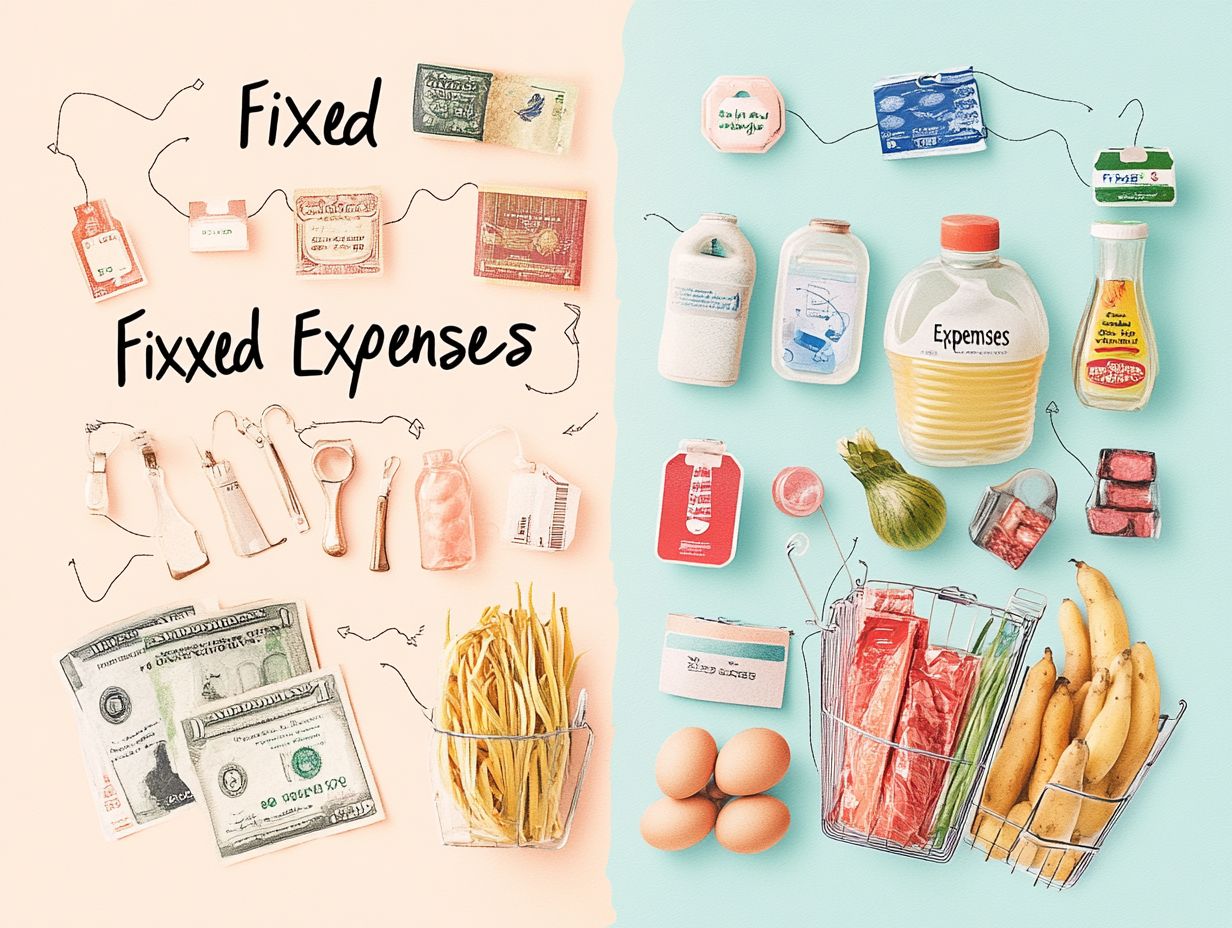
Common fixed expenses you ll likely encounter include rent payments, mortgage payments, insurance premiums, and utility bills. These demand careful monthly budgeting.
Knowing these costs helps you manage your money better! They’re the backbone of your monthly budget. Rent or mortgage payments can take a hefty slice of your budget, so it s crucial to calculate these figures accurately to steer clear of overspending.
Insurance premiums are a necessary evil for protection, but they can vary widely between providers. Evaluating your options can lead to considerable savings.
Utility bills covering essentials like electricity, water, and heating can be optimized through diligent monitoring and possibly switching service providers. Take charge of your expenses today! Prioritizing them can lead to a flexible budget and greater financial freedom.
Examples of Variable Expenses
Variable expenses represent a spectrum of costs that fluctuate from month to month. These profoundly influence your budgeting and optional spending choices.
These encompass groceries, entertainment, personal care, gas, and any other expenses that shift according to your lifestyle or consumption habits. Grasping these variable expenditures is essential for crafting a flexible monthly budget that seamlessly adjusts to your evolving financial landscape.
Common Types of Variable Expenses
Common types of variable expenses include optional spending on entertainment, groceries, personal care, and gas. These can fluctuate significantly each month, making them essential for maintaining a flexible budget.
These costs significantly impact your financial health and require careful management. For example, your entertainment expenses might include dining out, catching a movie, or subscribing to various services. These can quickly escalate if left unchecked.
Grocery bills can vary based on your dietary preferences and shopping habits. By choosing seasonal produce and planning your meals, you can substantially trim those costs. Personal care expenses, like haircuts and skincare products, often shift according to your preferences.
Meanwhile, gas expenses fluctuate with your travel habits and the ever-changing fuel prices. To manage these costs effectively, track your spending using budgeting apps and prioritize your expenses based on necessity versus luxury.
Consider lifestyle adjustments such as cooking at home or carpooling. These strategies can help you maintain a more balanced monthly budget.
How to Budget for Fixed and Variable Expenses
Budgeting for fixed and variable expenses demands a strategic mindset to ensure that both essential and optional spending are thoughtfully allocated within your financial framework.
By adopting effective budgeting methods, such as the 50/30/20 rule allocating 50% of your income to needs, 30% to wants, and 20% to savings you can skillfully channel your income towards fixed expenses like rent and insurance. This balanced approach cultivates greater financial stability.
It also gives you the power to achieve your savings goals with confidence.
Tips for Managing and Balancing Expenses
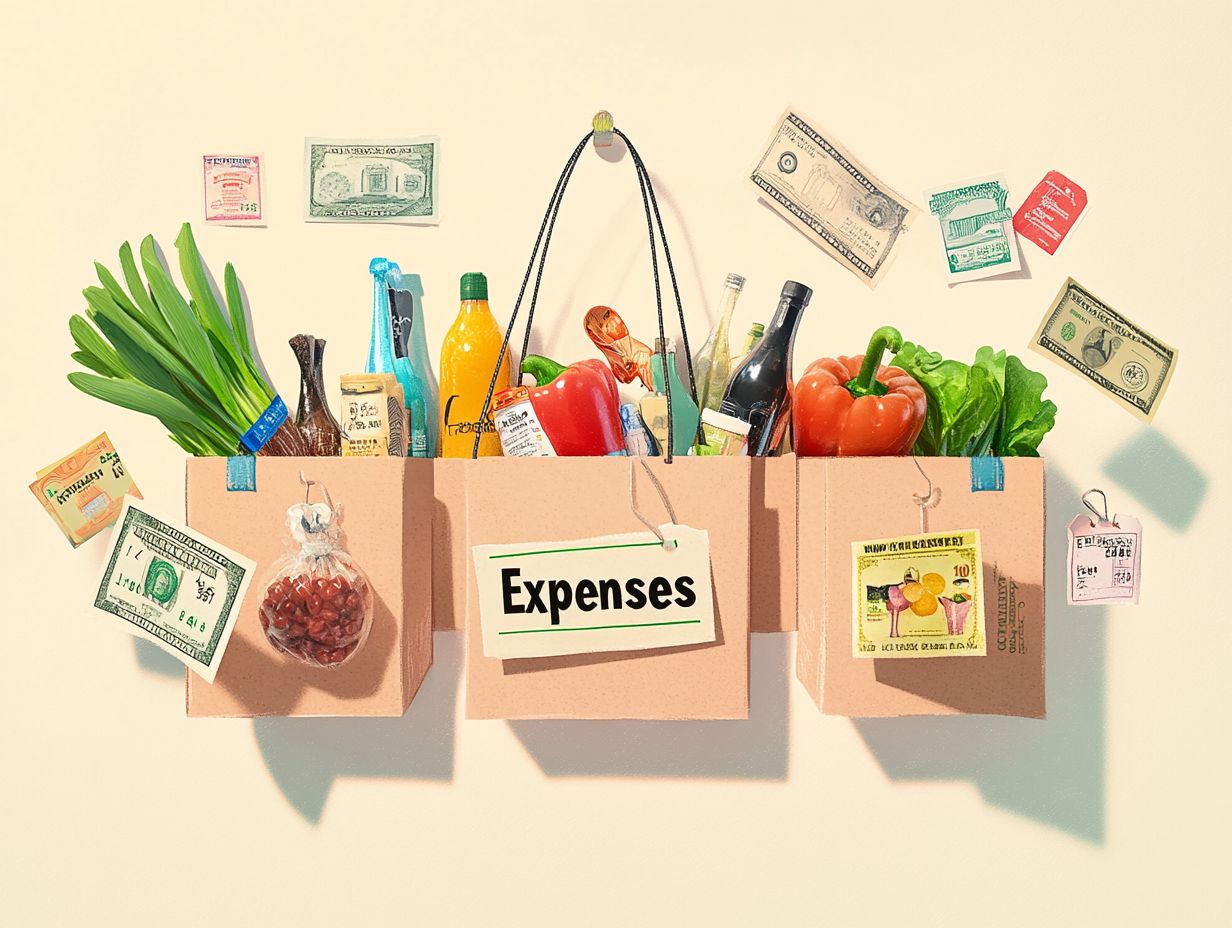
Managing and balancing your expenses requires practical budgeting strategies that empower you to make informed financial decisions and maintain control over your spending habits.
In today’s fast-paced world, unexpected costs can pop up, and fixed expenses often take a significant bite out of your monthly income. This makes effective management especially important.
You can start by tracking your spending using various digital budgeting tools or even trusty old spreadsheets. Ensure to categorize both fixed and variable expenses.
Regularly reviewing your budget allows you to make timely adjustments, helping you spot areas ripe for cost-cutting and potential savings.
Consider making lifestyle changes like dining out less or opting for public transportation as these small adjustments can lead to substantial savings.
Ultimately, by frequently evaluating your financial habits, you can empower yourself to enhance your stability and achieve your long-term goals.
The Importance of Tracking Fixed and Variable Expenses
Tracking your fixed and variable expenses is essential for mastering effective expense management. This practice gives you the power to make informed financial decisions and maintain control over your monthly budget.
Monitor your spending patterns actively to pinpoint areas for improvement. Fine-tune your budget as needed to keep aligned with your financial goals.
Not only does this enhance your understanding of personal cash flow the money that comes in and goes out of your budget but it also fosters accountability in both your necessary and non-essential spending.
How to Monitor and Adjust Expenses
Track your expenses diligently! This keeps your financial planning on track and helps you stay focused.
Regularly reviewing your spending habits allows you to see exactly where your money is going, helping you identify unnecessary expenditures that can be trimmed or eliminated.
Using expense tracking tools simplifies this process while providing real-time insights into your financial behavior.
Setting budgetary goals within these apps offers a visual representation of your progress, nurturing both accountability and motivation. Periodically assess whether your current spending patterns align with your long-term financial objectives.
This reflection may prompt necessary lifestyle adjustments, enabling you to cultivate healthier finances and better prioritize necessary needs over mere wants.
Frequently Asked Questions
What are Fixed and Variable Expenses?

Fixed expenses are the steady costs you count on each month, like rent. Variable expenses, on the other hand, fluctuate and can be adjusted, such as utility bills or groceries.
What are some examples of Fixed Expenses?
Examples of fixed expenses include rent or mortgage payments, car payments, insurance premiums, and subscription services. These costs typically remain the same each month and are necessary for maintaining a certain standard of living or running a business.
What are some examples of Variable Expenses?
Variable expenses can include costs such as electricity and water bills, groceries, entertainment, and transportation. These expenses can vary from month to month and can be adjusted based on personal choices or changes in needs and circumstances.
Why is it important to understand Fixed and Variable Expenses?
Understanding fixed and variable expenses is crucial for budgeting and financial planning. By knowing how much you spend on fixed expenses and how much you have left for variable expenses, you can better manage your finances and make informed decisions about your spending habits.
Take control of your finances now begin tracking your expenses today!
Can fixed expenses become variable expenses?
Fixed expenses can sometimes turn into variable expenses. For instance, refinancing a mortgage with a steady payment to one with changing payments can lead to unpredictable costs.
Insurance premiums may also change based on your driving record. This means they could become variable expenses as well.
What are some tips for managing fixed and variable expenses?
Track your spending and create a budget to manage fixed and variable expenses. This will help you identify areas to cut back on variable costs and save money.
Regularly reviewing your fixed expenses can reveal exciting opportunities to save! You might find a cheaper insurance provider or negotiate a lower rent.

